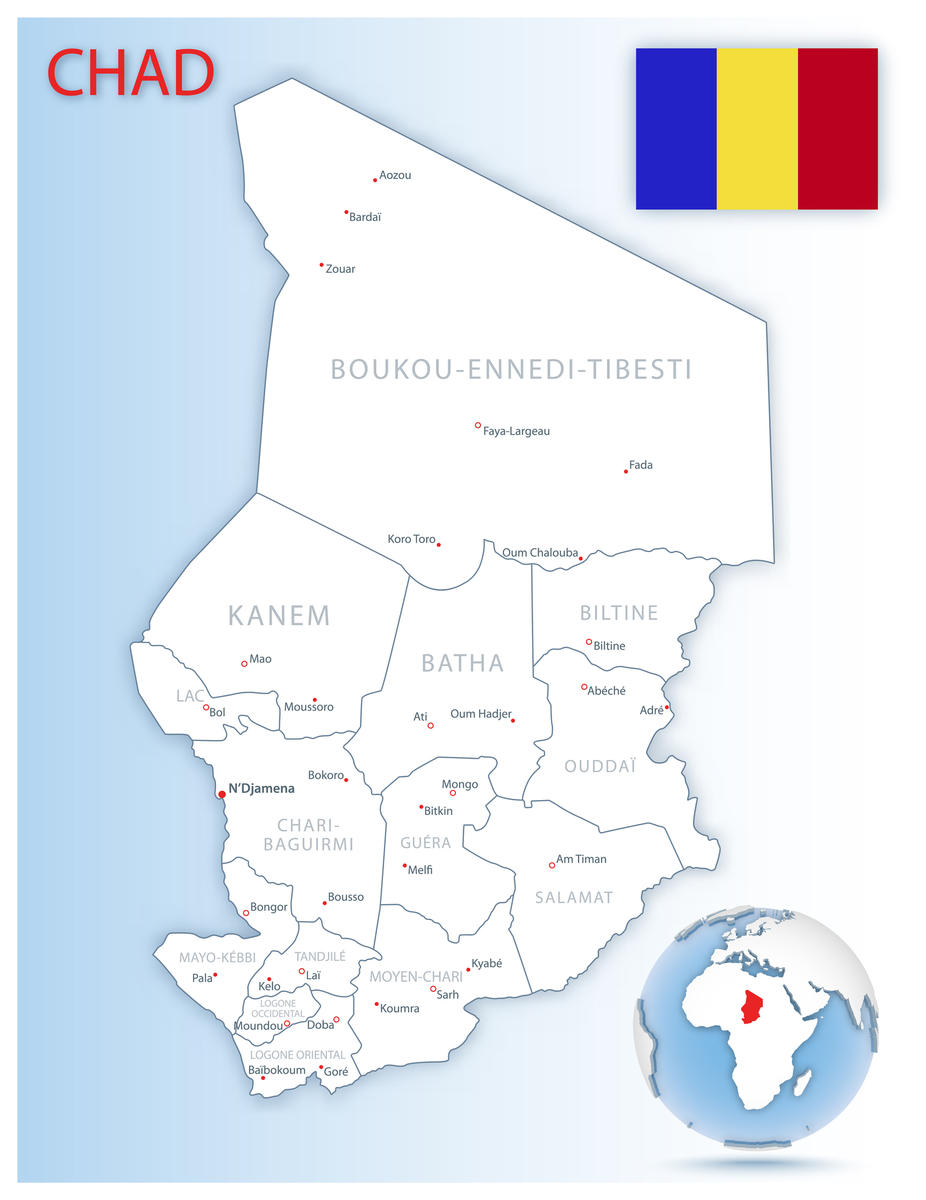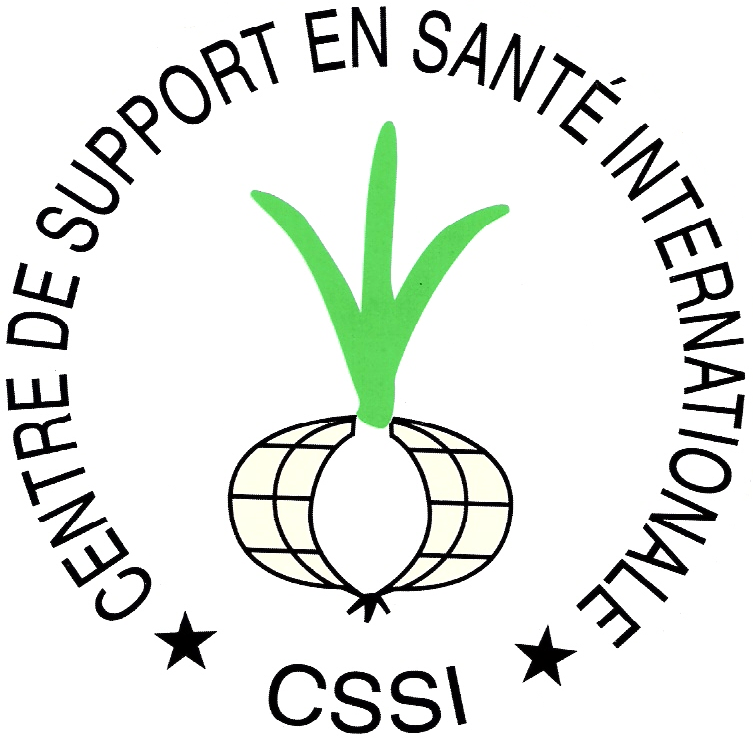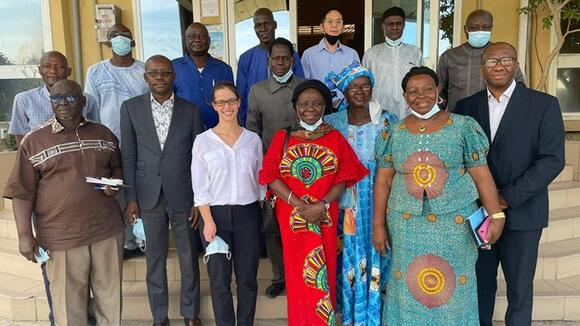
Chad

Chad is a vast landlocked country in north-central Africa home to approximately 16.4 million people, which covers an area 1,284,000 sq. kmincluding a large portion of arid and desert landscapes in the North and Centre, fertile Savannah and rainforests in the South, and wetland in the area of lake Chad. Its neighbours are Niger, Libya, the Sudan, the Central African Republic, Cameroon, and Nigeria.Chad suffers from impacts of climate change, which is exacerbating desertification and the drying up of Lake Chad.
The country has witnessed intermittent coup attempts and rebellions throughout its history and grapples with security challenges associated with conflicts in bordering countries. The recent death of President Idriss Deby Itno in April 2021 saw the establishment of a Transitional Military Council chaired by Mahamat ibn Idriss Deby Itno, son of the former president and current interim president.
Although an oil-producing nation Chad has consistently remained one of the poorest countries in Africa. This is partly a result of the harsh geographical conditions with the majority of Chad covered by desert. Climate change, geographic isolation, a lack of cultural cohesion as well as education are all contributors to the problem. Chad has one of the lowest scores on the Human Capital Index (HCI) at 0.3, meaning that children born today in Chad will only be 30% as productive when they grow up as they could be if they had access to good health, education, and nutrition.
Maternal and newborn health in Chad
Many people in Chad live in rural areas with little to no access to healthcare (Universal Health Coverage of around 31.4%1).Coverage for reproductive, maternal, newborn and child health in Chad is similarly low, estimated to be between 28.9-33.5%2. The average life expectancy in Chad is just 61 years for women and 58 for men1.
Chad has the second highest maternal mortality rate in the world, with 1,140 deaths for every 100,000 live births3. Some of the leading causes of death for women in Chad are complications related to pregnancy and childbirth.Women often have to walk several hours to reach a health centre or to see one of the few doctors in the country. Only 24% of births are assisted by qualified personnel and other high-impact interventions.As a result, many women die during childbirth without having received any medical attention. Currently, child mortality rate for Chad is 113.8 deaths per 1,000 live births3, far exceeding sustainable development goal targets of 25 per 1,000 live births by 2030.The high child mortality rate appears to be partially driven by low rates of vaccination and exclusive breastfeeding,high rates of malnutrition, as well as poor access to safe water, sanitation, and hygiene1.
1 https://www.healthdata.org/chad
2 https://journals.plos.org/plosone/article?id=10.1371/journal.pone.0232350
3 https://data.unicef.org/country/tcd/

Our work in Chad
Funded by the Global Fund to Fight AIDS, Tuberculosis and Malaria, we started to work in Chad in 2018. Our aim is to increase and improve the availability and quality of integrated ANC and PNC, including HIV, tuberculosis and malaria control in health facilities; to strengthen monitoring and evaluation (M&E) at facilities involved; improve maternal and newborn health through assessing maternal morbidity and neonatal morbidity; disseminate and communicate lessons learned and results via conferences, events and peer-reviewed publications.
Programme history
First phase in 2018
In this initial phase, establishing nationally adapted standards of care for ANC-PNC, and a baseline of information on the availability and quality of care offered in healthcare facilities across the country was a key priority for the government to identify gaps to be addressed. Specific standards were developed, alongside capacity strengthening packages and manuals. The initial Health Facility Survey (HFS) was conducted in 12 regions (Batha, Borkou, Ennedi Est, Hadjer-Lamis, Kanem, Logone Oriental, Mandoul, Mayo-Kebi Est, Mayo-Kebi Ouest, Moyen Chari, N’Djamena, Tandjile), in a selected sample of 60 healthcare facilities (HCF), comprising a mix of public, private and faith-based facilities at primary, secondary and tertiary levels of care. The HFS results raised concerns over the lack of infrastructure and low staffing level of healthcare providers involved in ANC-PNC, the variable availability of equipment and consumables, as well as incomplete ANC follow-up compliance and rare PNC attendance. This all evidenced an unfulfilled potential for identifying and managing those who need support in the areas of HIV, TB and malaria and other integrated services, thus offering a strong platform for improvement of ANC-PNC in content and quality, with integration across the three main diseases.
To prepare the capacity strengthening activities of Phase 2, a national cohort of master-trainers (MT) was trained in ANC-PNC (18) and Standards-based audit (18).
Second phase 2020 – 2021
The second phase of the programme, which ran between April 2020 and December 2021, aimed to improve the availability and quality of integrated HIV, TB and malaria services delivered to mothers and newborns in facilities providing antenatal and postnatal care (ANC and PNC) across the country. To achieve this, we worked closely with Ministry of Health Officials and LSTM’s local partner CSSI-CRASH and other stakeholders involved in the improvement of the health sector in Chad.
Integrated service delivery has the potential to increase the quality and efficiency of the health system and maximise the impact for those affected by HIV, TB and malaria. We hope this work will generate evidence of ways and means to increase the availability and quality of care available to mothers and babies throughout the country, leading to better health outcomes. The programme was completed and its results disseminated to all national stakeholders in N’Djamena in December 2021 (read blog post for further information).
Main achievements of the programme included:
- A general improvement to the availability of integrated ANC and PNC in Chad, with the capacity strengthening of 18 Master Trainers and 288 healthcare providers, as well as providing essential equipment and hygiene products to 61 healthcare facilities.
- The introduction of a quality of care culture based on bespoke quality improvement standardsdeveloped with national stakeholders for the local context in Chad. This was conducted with the capacity building of18 Master Trainers and 120 healthcare providers A monthly monitoring and evaluation follow-up on the availability and quality of care which informed Chadian maternal and child health policy making.
- The completion of stepped-wedge randomised controlled trial to estimate the impact of ‘Skills and drills’ competency-based ANC-PNC capacity strengthening of healthcare professionals on professional practice in the delivery of ANC-PNC essential components during ANC and PNC (results pending publication).
- The creation of a regional risk-score for maternal and newborn health to support decision-making, which is included in the national Reprodutive, Maternal, Newborn and Child Health national strategic dialogue in 2022.
- The dissemination of results lessons learned at a national workshop and high-level meetings in December 2021, to be followed by futureconferences, events and peer-reviewed publications.
LSTM team
Dr Alexandre Quach (Senior Research Associate), alexandre.quach@lstmed.ac.uk,
phone+44 (0)151 702 9535
Dr Florence Mgawadere (Senior Research Associate), florence.mgawadere@lstmed.ac.uk,
phone+44 (0)151 702 9315
In-country team
-
Dr. Rolande Mindekem: Chad Senior technical officer (National Coordinator)
-
Mr. AlnodjiKelos: Chad Admin program coordinator (Admin and Finances)
-
Mrs. Melanie Kemneloum: M&E officer (Data collection and Quality assurance)
-
Mrs. Grace Guidjina: M&E officer (Data collection and Quality assurance)
Partners

The Ministry of Public Health (Ministere de la SantePublique – MSP) in Chad guides the program’s strategy and targets to meet national priorities in MNH. The Technical General Directorate for Reproductive Health, Vaccination and Nutrition (Direction Generale Technique de la Sante de la Reproduction, Vaccination et Nutrition) and the Directorate for Mother and Child Health (Direction de la Sante Mere-Enfant) are strongly involved in facilitating the program’s activities and setting national standards for ANC-PNC. The program is also supported by the technical advisory group from the Sexual, Reproductive, Maternal, Neonatal, Infant and Adolescent Health platform (SRMNIA-N-GFF). Finally, the MSP hosts the Project Management Unit (Unite de Gestion des Projets – UGP), who as Global Fund Principal Recipient for HIV, TB and Malaria, is the program’s donor.

The Centre for Support in International Health (Centre de Support enSante Internationale – CSSI), is the GFAPU’s main implementation partner in Chad. With a rich portfolio of humanitarian, health promotion, research projects, CSSI has a strong presence across the national territory and contributes to the design of GFAPU research protocols and national capacity strengthening strategy. The CSSI hosts the GFAPU in-country team and coordinates the administrative as well as logistic support for all activities. CSSI is part of a consortium with the Centre for Research in Anthropology and Human Sciences (CRASH),who contributes to the program’s operational research activities. The partnership between LSTM and CSSI goes beyond the implementation of projects and aims for a dynamic co-construction of both entities: LSTM has been involved in strengthening systems such as supporting CSSI safeguarding capacity-building.
International team
Key-partners
-
Dr. Grace Kodindo: Technical General Deputy Director for Reproductive Health, Nutrition and Vaccination (National focal point)
-
Mr. Jean-Pierre Gami:Technical Advisor to the program for the MSP
-
Dr.DauglaDoumagoum Moto: Director, CSSI
-
Mr. Jean Naissengar: Head Admin, CSSI
-
Dr.MoyengarRonelngar: International Public Health Referent, CSSI
-
Mr HamitKessely: Research support, CSSI
-
Dr.YamingueBetinbaye: Researcher, CSSI-CRASH
-
Mr. AliKoitigam: Research Assistant/Data Officer, CSSI-CRASH
Completed studies
-
Healthcare facility baseline assessment on antenatal and postnatal care, with specific focus on HIV, TB and Malaria in selected healthcare facilities in Chad (2018) – Completed in 2018
-
Randomised stepped wedge trial to assess the effectiveness of healthcare provider training on the availability and quality of Antenatal (ANC) and Postnatal Care (PNC) in Chad – August 2020 to December 2021
-
Development of a Risk Scoring System for Maternal and Child Health in Chad – October to December 2021
